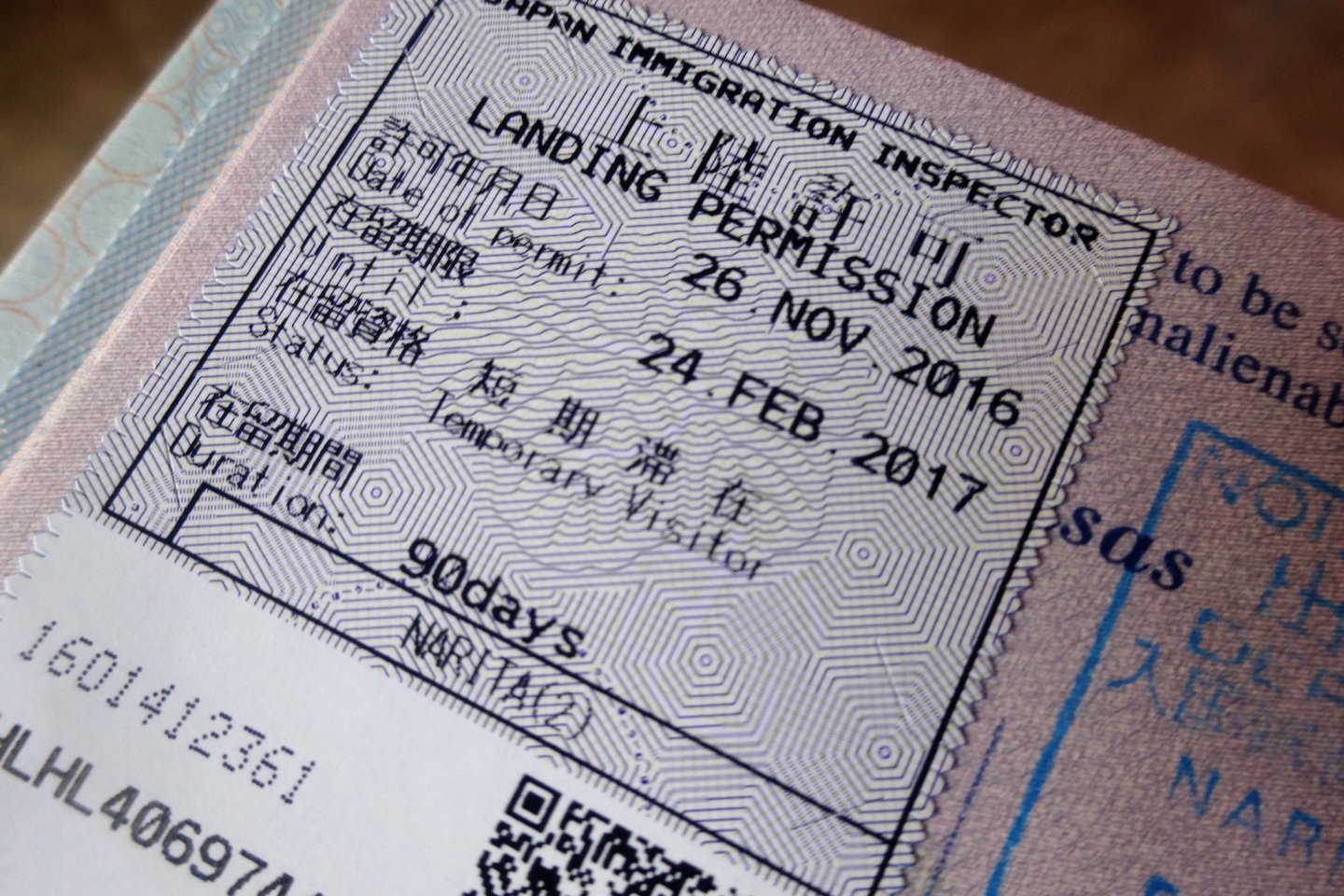Every foreign national entering Japan must possess a valid visa. Whether that visa is issued on arrival or applied for in advance is based on what type of "residence" the visitor is seeking.
Below is a brief introduction to some of the visa categories for visitors coming to Japan. For specific questions and more detailed information, it is always best to check with your local Japanese embassy/consulate or the immigration bureau in Japan.
Temporary Visitor Visa
Most visitors to Japan can enter the country on a temporary visitor visa, or tourist visa, thanks to visa exemption agreements between Japan and many foreign countries.
For residents of over 60 countries (a full list can be found here), a fee-free 90-day visa is issued upon arrival. This requires no advance paperwork and amounts to being merely a landing permission stamp in the traveler’s passport. Visitors from a few select countries (including Thailand, Brunei and Indonesia) are permitted to enter Japan on a 15-day fee-free visa and 30 days for the United Arab Emirates
Visitors of certain nationalities (Austria, Germany, Ireland, Liechtenstein, Mexico, Switzerland or the United Kingdom) who enter Japan on a 90-day visa can extend their stay in the country by up to six months. Those interested in this option would need to apply for an extension—usually after the halfway mark of an existing visa—at the nearest immigration bureau in Japan.
Student Visa
Those who would like to attend university or language courses in Japan that last longer than 90 days should apply for a student visa.
Most universities and schools will be able to assist potential students with the application process. An application usually needs proof of enrollment at a host institution and evidence that a student can capably support themselves financially during the term of study.
Students who hope to seek part-time employment to supplement their savings while in Japan would have to apply for special permission from the local immigration bureau.
Most student visas are issued for a term of three months to just over 4 years. This can be extended if the student can prove he is still enrolled.
Working Holiday Visa
Citizens of 23 countries/regions (France, Germany, Austria, Slovakia, UK, Ireland, Portugal, Denmark, Norway, Taiwan, Hong Kong, South Korea, Canada, Australia, New Zealand, Poland, Hungary, Spain, Argentina, Chile, Iceland, Czech and Lithuania) can enter Japan on a working holiday visa.
This status allows visitors to pursue part-time work for up to a year in Japan. This visa is not intended for full-time positions, but rather for a series of short-term opportunities.
To apply for this program, visitors must be between the ages of 18 and 30 (both inclusive at the time of visa application) however the condition of age may be different depending on the applicant's issued country. They are required to hold citizenship in one of the aforementioned countries, and submit the following documents for consideration:
- Submit both the required form and a CV (resume)
- Supply proof that you possess sufficient funds to support yourself
- Register at the embassy of your home country upon arrival in Japan
More information can be found at the Ministry of Foreign Affairs Working Holiday official site and the Japan Association for Working Holiday Makers website (which also has a very useful job posting board).
Work Visa
Those who wish to engage in paid, full-time activities in Japan must enter the country with a valid work visa. Work visas are issued based on what area or field you will be working in during your time in Japan (i.e. journalism, business management, the arts, teaching, engineering, entertainment, etc). If you change jobs within Japan to a different field, it is necessary to apply for a different type of work visa.
Work visas are issued mostly to those who have either advanced degrees (university level or higher) or who possess a significant amount of experience in their field. It helps greatly to have a company "sponsor", showing that you have potential (or guaranteed) employment upon arrival.
Work visas are generally issued for a period ranging from four months to five years and are renewable.
In some cases it is possible to switch from another visa type to a work visa from within Japan if the applicant meets the required conditions — check the Application for Change of Status of Residence page on the Immigration Bureau of Japan website.
Other Visas
Several other visa categories exist that don't fall into the major categories above. These include the SOFA visa (for military members stationed in Japan or on orders), investor visa, and skilled foreign worker visa. A Digital Nomad Visa was also introduced in 2024.
For more details on those visas, as well as the ones mentioned above, please contact your local Japanese consulate or see the Ministry of Foreign Affairs website for guidance. For information regarding Specified visas such as Spouse or Child of a Japanese national please check this page on the Ministry of Foreign Affairs website.

























